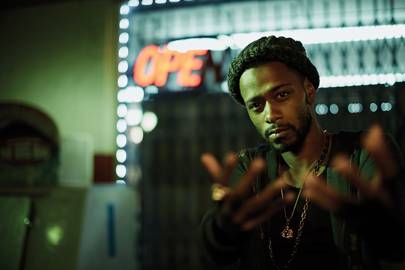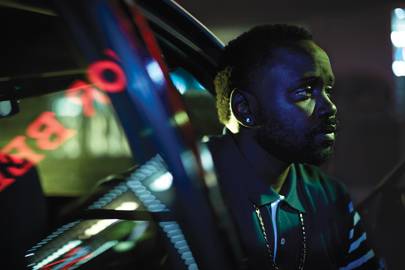There's a moment in Atlanta – the funny and urgent and alternately angry and stoned drama from Donald Glover, which is set to do for the city what The Wire did for Baltimore – that sums up the series' mix of social commentary, dreamlike fable, gritty realism and Cheech & Chong.
Glover – also known by his hip hop alter-ego Childish Gambino, Troy in Community and the young Lando Calrissian in Star Wars prequel Solo – plays Earnest "Earn" Marks, a Princeton dropout and sometime manager of his cousin, hip hop wannabe Alfred "Paper Boi" Miles. In the fourth episode, Earn – perennially broke, essentially homeless, struggling to provide for his daughter – visits a pawn shop to sell his phone with Paper Boi's right-hand man, Darius, who's part visionary, part idiot and full savant. He finds Darius gazing at a Samurai sword. "Get this sword," he says. "We could trade up on it. Get you a lot more money."
And so, like in a nursery rhyme, they trade phone for sword, then sword for dog and then take the dog to a dog breeder, who'll sell the eventual puppies for $2,000 a pop and return a handsome profit... in a few months. Earn is aghast: "See, I'm poor, Darius," he explains. "And poor people need to eat today, not in September."


Atlanta is about a lot of things – race in the US, the music industry, how social media tramples social interaction, Atlanta itself – but the prime one is poverty, how being poor comes with its own tariffs, how having money comes with its own dividends.
We watch as Earn must shell out hundreds just for the pleasure of being drug-tested; when asked if he can pay, he replies incredulously, "No!" If he could, he wouldn't be there in the first place.
Atlanta is a comedy, but has the natural rhythms of drama rather than the rigged rat-a-tat of sitcom. And yet, as much as it doesn't shy away from the reality of those hustling day-to-day, it has a woozy (or maybe just stoned), dreamlike quality to it – not quite the full-on backwards-talking midgets of David Lynch, but small snatched moments of surrealism, at once both unreal and yet too real, like the moment just after an accident.
It's there in the very first scene of the first episode, when Darius – in the middle of a tense gun-drawn standoff – dreamily says he's having a moment of "crazy déjà vu" and correctly predicts the appearance of a dog. In one episode, a rapper is said to have an invisible car, which is disbelieved until an accident sends people flying like puppets whose strings have been yanked. In another, we meet "Justin Bieber", who's exactly like the Justin Bieber you know and hate, except, well, this Justin Bieber is black.
All of these are funny, yet none are quite jokes and that's sort of the point. Glover delights in delivering more setups than punchlines and the result gives the show a quality of constant anxiety. And isn't that, after all, what poverty boils down to – never quite knowing what's next, knowing your destiny is never quite not your own? Someone knocks on Paper Boi's door in a Batman mask, only to run away when told he's in. A boy in class sits at the back in "white face", grinning. Atlanta is often as unsettling as it is funny.


The show is Glover's – he's both exec producer and head writer – but Glover's character isn't the centre of the show. Sure, he has his Tim-from-The-Office moments, such as the episode set in a nightclub in which he lets loose: "I hate shots! I hate the club! I hate the people at the club!" He has the occasional Larry-David-in-Curb moments, such as the time he rails at the fact the local fast-food place won't let him buy a child's meal unless he's a child: "So the kid has to wait in line and order a kid's meal? Do you have to be Chubby Checker to buy the Chubby Checker?"
But the heart of the show belongs to Paper Boi (played by Brian Tyree Henry), by turns insider and outsider, both aware of the game he's playing, but forever bemused by it, hulking around a frame that frightens but tired of having to use it. With his self-titled song, he's got a verifiable hit, but he makes no money from it (especially ironic as the song itself is about making money: "Paper Boi, Paper Boi / Always gettin' paper, boy / If you ain't makin' money / Then you ain't a money maker, boy") and so he must deal weed to get by. But even here he comes undone.
In the second episode of the new series – entitled "Robbin' Season" after the real pre-Christmas period in Atlanta when theft increases – Paper Boi finds himself mugged by his own plug (ie, his wholesale dealer). When the gun is pulled his eyes widen, but out of sadness rather than fear. He exhales loudly and the exhale seems to say, God damn. Even this?
The plug, meanwhile, is pragmatic. He takes Paper Boi's keys so he won't drive after him ("Appreciate it, brah"), eventually lets him out after navigating the child lock ("That's the window, man!" says Paper Boi, frustrated) and says he would take him home, but won't, as "You might come out shooting at me and shit." Finally, holding the gun out of the car window as he drives off, the plug says, "Sorry about this, man. I'm gonna pay you back."
We end with the sad silhouette of Paper Boi standing in the middle of the road, a situation both serious and surreal. From one perspective, what happened makes perfect sense and yet, from another, it makes no sense at all.
Atlanta: Robbin' Season starts Sunday 17 June on FOX UK at 10pm
The new series of Westworld holds a mirror to #MeToo
Tidak ada komentar:
Posting Komentar